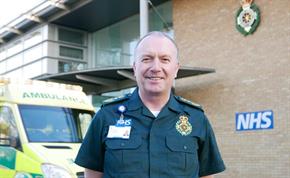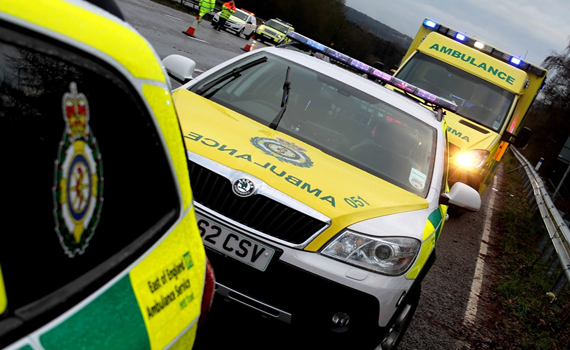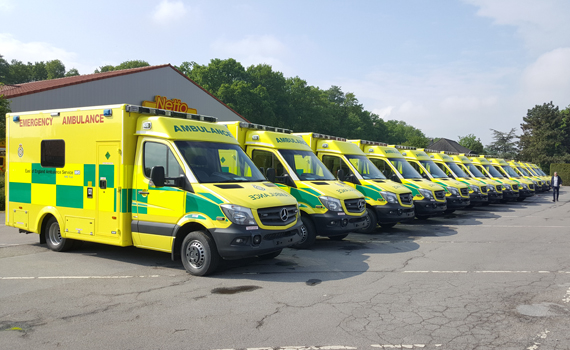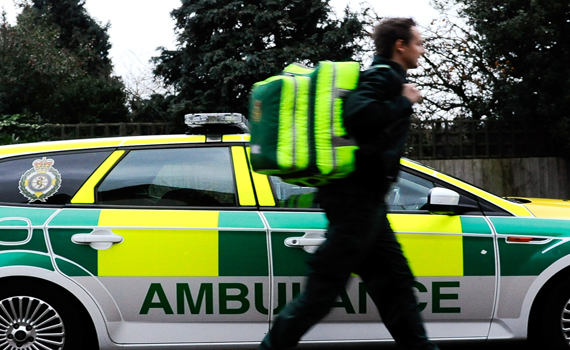Date:
20 April 2024
Page URL:
https://ntk.eastamb.nhs.uk/news/spring-2017-update-from-ceo-robert-morton-2nd-february.htm?pr=
Spring 2017: update from CEO Robert Morton (2nd February)

Well we are into February already and it feels like January passed in a blink. Demand for our services continues to be way above what we would expect so the pressure on all of us continues. Despite this, we continue to deliver improvements and continue to be in the top three performing trusts each week. Not only are we getting to more people more quickly than ever before, but more importantly, the clinical quality of the care we deliver continues to be reflected positively in the feedback we get from our patients. So, well done and thank you all, including all of our support service colleagues, without whose hard work our patient facing services could not function.
Many colleagues have flagged their frustration at the perceived focus on performance above all else. As we will have all seen from recent media coverage, the reality is that the public discourse about ambulance services continues to focus on response times rather than the relevance and quality of care we provide.
Those of us whom are clinicians are acutely aware that the eight minute target is clinically irrelevant for the majority of the one million plus patients that used our services last year. What we know is important is the clinical effectiveness of the care we provide and the pathway we choose for our patients. However, our current emergency service contract with commissioners continues to be based predominantly on time based measures. Therefore, operational performance remains a constant reality with continuous pressure from both our commissioners and regulators to deliver. There is light on the horizon as in the not too distant future, we do expect some important decisions on the national Ambulance Response Programme (ARP), which is examining the feasibility of changes to the historical time based target regime.

In last week’s message I gave a brief update on the first of our public Trust Board meetings of the 2017 year. It was a ‘bumper issue’ with many issues discussed so I thought it would be helpful to provide you all with a little more depth on some of those here.
As you would expect, the pressure our service and people are under, and the financial consequences of responding to that demand and relieving some of the pressure on our workforce, dominated the agenda. The Trust Board were keen to hear how the pressures we are all under (including during periods of Surge Black, i.e. when more than 120 patients are waiting for a response), were being managed so as to ensure we were maintaining the balance between having sufficient capacity to respond to patients waiting and ensuring staff get a break.
Our Trust Board has provided us with a clear direction in that we cannot allow the scale of demand to reverse the improvements we have made in 2016. In the context of dramatic increases in demand and protecting the abstraction of our student paramedics to university, we have had to commit to using significant volumes of private ambulance services (PAS). This position is now a matter of public record. Despite this position, we still have an obligation to ensure our services are delivered as efficiently as they can be. Hence, Kevin Smith, Director of Finance and Commissioning, is ensuring we continue to work with the NHS Improvement (NHSI) Financial Improvement Programme (FIP) team to deliver efficiencies in a range of areas they have observed and identified. Director of Strategy and Sustainability Wayne Bartlett Syree, who holds responsibility for procurement, is working to ensure best value from all existing contracts. Wayne also joined a ride-out in Kempton this week (refreshing his clinical skills in the process!), and has reported back how humbled he was by the professionalism shown by everyone he met, not the least his crew of Michael and Hugh who dealt with a very complex and challenging cardiac arrest call during the shift.
When out and about, many of you have told me about opportunities that may exist to improve the way in which we deploy and utilise our PAS resources. This matter has now been validated by the NHSI FIP team and is now a key area we are working hard to improve.

The Trust Board also heard about the consistent increase in our weekly unit hour production (UHP) and in particular, the ongoing rise in ambulance (DSA) hours; we are now putting out more DSA hours than ever before. Kevin Brown, our Director of Service Delivery believes that changes that may emerge from the ARP will support our approach to increasing DSA hours at the expense of rapid response vehicle (RRV) hours. Linked to this, we also heard from Lindsey Stafford Scott, our Director of People and Culture about recruitment, including international recruitment and the importance of retaining our existing staff despite all of the opportunities that now exist outside of the Trust. It was refreshing to hear that retention continues to improve with the Trust now having the second lowest level of staff turnover in the ambulance sector nationally.
Key presentations were also made by our patient transport services (PTS) team, who briefed the Board on continuing quality improvements for patients - evidenced by a reduction in complaints and an increase in compliments. The Trust User Group gave an overview of what they were doing to support a diverse variety of Trust activities, and how they were aligning themselves to work with the Trust given the changes that were emerging in response to sustainability and transformation plans (STPs) across our region.
Members of the Cultural Audit Steering Group also gave an excellent ‘state of play’ presentation on the work that the Trust commissioned a year ago. It was pleasing to hear that the final report is expected in February. Unlike traditional surveys, this piece of work is much more evidence based and has gone further in that it has also analysed the health impact, or not as the case may be, of workplace experience, and which interventions are likely to have the most benefit for all of us. It was great to hear from the steering group on what they felt were the ‘quick wins’ to support positive cultural change.
It was not surprising to hear that leadership was the most important issue that had the greatest positive impact. This correlates strongly with our Care Quality Commission (CQC) report which told us we need to invest in our middle managers, particularly at Band 7 level. Therefore, investing in developing our Band 7 managers in the 2017/18 year is likely to be a key focus for the Trust. This will mean that we also have to reflect on our current dependence of using them to support student paramedic abstractions to university.

The company (Zeal Solutions) that is undertaking the work told us that the 1,771 staff who participated was the highest level of engagement seen across the many ambulance trusts they have worked or are working with. It was therefore great to hear that only 2% of respondents reported any experience of bullying and harassment. We were informed that many of these comments related more to examples of poor behaviour rather than actual examples of bullying.
The Trust Board heard that the NHSI FIP had identified that our expenditure on support services was 5.4%, which is less than the Lord Carter Review target of 7% (NHS Efficiency Target). Given the very lean nature of our support services, the Board was disappointed to hear about the pressure that our information governance team, colleagues whom process Freedom of Information (FOI) requests amongst many other things, were under. The Trust heard that we receive twice as many requests as other ambulance trusts. While it is important that the Trust continues to support the spirit and intention of the Freedom of Information Act, the money spent on responding to what are potentially some FOI requests with inappropriate intent and which do not align with our values, could be re-focussed on service delivery to patients or staff wellbeing. Therefore, the Chair of our audit committee confirmed his intention to scrutinise this matter further and report back to the Trust Board.
In the context of the learning from last year’s report about the South East Coast Ambulance Service NHS Foundation Trust, the Chair of our Quality Governance Committee also gave an account of the scrutiny applied to some of the recent changes to our Surge Plan, in particular, the changes we have made to identify low acuity calls that do not need a response and manage them more effectively. Again, this is something that many of you have told me as I travel around the Trust needed to be introduced. Board directors were therefore pleased to receive assurance from Dr Mark Patten, Medical Director, and Sandy Brown, Director of Nursing and Clinical Quality, about the safety of these decisions and the excellent work of our emergency clinical advice and triage (ECAT) team. Well done ECAT!
Have a good week,
Robert
Published 2nd February, 2017
